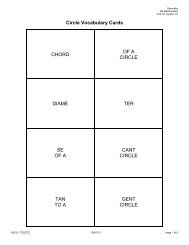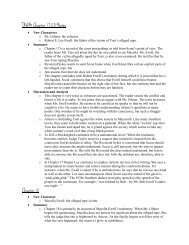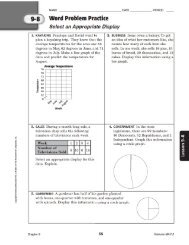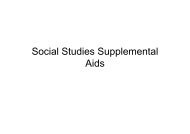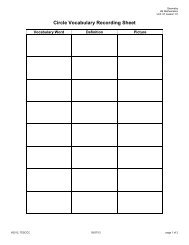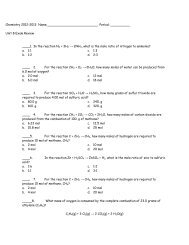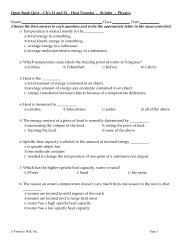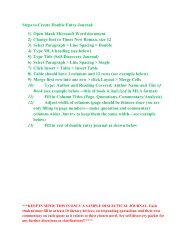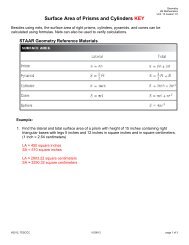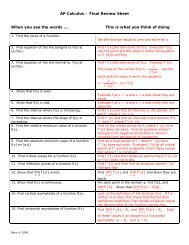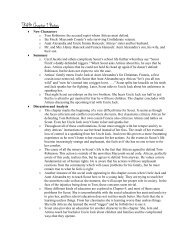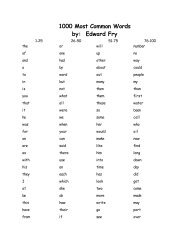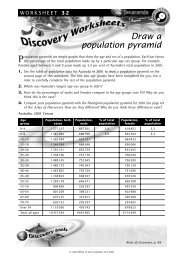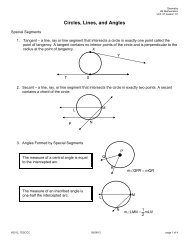Choose the best answer to each question and write the appropriate ...
Choose the best answer to each question and write the appropriate ...
Choose the best answer to each question and write the appropriate ...
Create successful ePaper yourself
Turn your PDF publications into a flip-book with our unique Google optimized e-Paper software.
<strong>Choose</strong> <strong>the</strong> <strong>best</strong> <strong>answer</strong> <strong>to</strong> <strong>each</strong> <strong>question</strong> <strong>and</strong> <strong>write</strong> <strong>the</strong> <strong>appropriate</strong> letter in <strong>the</strong> space provided.<br />
16) If an object has a density equal <strong>to</strong> <strong>the</strong> density of water, it will __________.<br />
A) float B) sink C) nei<strong>the</strong>r float nor sink<br />
17) If <strong>the</strong> part of an iceberg that extends above <strong>the</strong> water were removed, <strong>the</strong> __________.<br />
A) iceberg would sink.<br />
B) iceberg would rise higher in <strong>the</strong> water.<br />
C) density of <strong>the</strong> iceberg would change.<br />
D) pressure on <strong>the</strong> bot<strong>to</strong>m of <strong>the</strong> iceberg would increase.<br />
18) When first put in water, a plastic <strong>to</strong>y boat will sink until __________.<br />
A) it displaces a volume of water equal <strong>to</strong> its own volume<br />
B) it displaces a weight of water equal <strong>to</strong> its own weight<br />
C) <strong>the</strong> water density equals <strong>the</strong> density of <strong>the</strong> boat<br />
D) <strong>the</strong> buoyant force equals <strong>the</strong> volume of <strong>the</strong> boat<br />
19) Pressure in a liquid depends on <strong>the</strong> __________.<br />
A) density of <strong>the</strong> liquid.<br />
B) volume of <strong>the</strong> liquid.<br />
C) mass of <strong>the</strong> liquid.<br />
D) depth of <strong>the</strong> measuring point.<br />
E) both A <strong>and</strong> D<br />
20) If an object has a density greater than <strong>the</strong> density of water, it will __________.<br />
A) float B) sink C) nei<strong>the</strong>r float nor sink<br />
21) When a boat sails from fresh water <strong>to</strong> salt water, <strong>the</strong> boat will float __________.<br />
A) lower in <strong>the</strong> salt water B) higher in <strong>the</strong> salt water C) at <strong>the</strong> same level<br />
22) When you float in salt water compared <strong>to</strong> floating in fresh water, <strong>the</strong> buoyant force that<br />
supports you is __________.<br />
A) greater B) less C) <strong>the</strong> same<br />
23) An egg is placed at <strong>the</strong> bot<strong>to</strong>m of a bowl filled with water. Salt is slowly added <strong>to</strong> <strong>the</strong><br />
water until <strong>the</strong> egg rises <strong>and</strong> floats. From this experiment, one can conclude that<br />
__________.<br />
A) calcium in <strong>the</strong> eggshell is repelled by sodium chloride.<br />
B) <strong>the</strong> density of salt water exceeds <strong>the</strong> density of egg.<br />
C) buoyant forces do not always act upward.<br />
D) salt sinks <strong>to</strong> <strong>the</strong> bot<strong>to</strong>m.<br />
© Prentice Hall, Inc. Page 3



